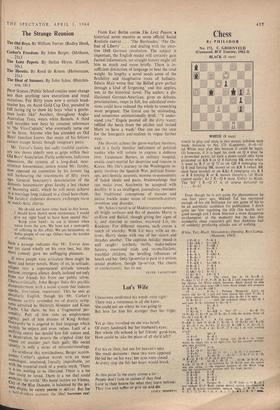The Strange Reunion
PREP SCHOOL/Public School routine must change less than anything save executions and royal occasions. For thirty years now a certain head- master has, on Ascot Gold Cup Day, paraded in full racing rig to show his boys 'what a gentle- man looks like.' Another, throughout Anglo- Australian Tests, wears white flannels. A third still mystifies new boys by constant references to 'the Vice-Captain,' who eventually turns out to be Jesus. Anyone who has attended an Old Boys' function knows that many of his fellows cannot escape heroic though imaginary pasts.
Mr. Trevor's funny but sadly truthful caution- ary tale shows elderly men at grips within their Old Boys' Association. Futile ambitions, ludicrous obsessions, the tyranny of a long-dead, near- criminal housemaster, centre round Mr. Jaraby, now opposed on committee by his former fag still harbouring the resentments of fifty years ago. General Sanctuary's denunciation of the demonic housemaster gives Jaraby a last chance of becoming adult, which he will never achieve in a marriage long reduced to a ritual hate-chant. The Jarabys' elaborate domestic exchanges recur in mock-Attic chorus.
'He should not have come back to this house. 1 should have shown more intolerance. I would give my right hand to have been spared this.'
'Keep your hand: its use is limited when taken from the arm. We have not a monopoly of suffering in this affair. We are bystanders, as befits people of our age. Others bear the burden of suffering.
Such a passage indicates that Mr. Trevor does Rot yet stand wholly on his own feet, but this short comedy gave me unflagging pleasure.
If more people were articulate there might be fewer and better novels. Many of us, in solitude, relapse into a supernatural attitude towards fortune, strangers, silence, death, isolated not only from our friends but from our public selves. Characteristically, John Berger links this psychic dismemberment with a social system that induces apathy, frustration, resentment. This he sees as Peculiarly English, though his Mr. Corker's dilemma swiftly reminded me of drastic symp- toms admitted by Heinrich Himmler and Klaus uchs. Like them, he has a fragmented per- rnality. Part of him runs an employment "gencY, part of him dreams of King Arthur. Outwardly he is angered by bad language which secretly he enjoys and even values. Lack of a un!fying centre has denied him full stature and, in desperation he deserts the crippled sister for whom yet another part feels guilt. His social identity is only a series of misunderstandings. To reinforce this wretchedness, Berger accom- panies Corker's spoken words with an inner monologue, unuttered, literally improbable, yet with the essential truth of a poetic myth. 'There that rile waiting to be. liberated. There is a me embrace could be loved. There is a me that could c-,....urace the world.' His banal lecture on Vienna, v City of the 13lue Danube, is balanced by the pri- vate elegiac he vainly yearns to deliver. But for a '1W-drunken moment the ideal becomes real. From East Berlin comes The Lenz Papers, a historical novel massive as some official Social Realistic canvas . . . 'The Barricades,' The De- feat of Liberty' . . . and dealing with the abor- tive 1848 German revolution. The subject is important, the English reader will certainly gain factual information, yet straight history might tell him as much and more briefly. There is in- sufficient distinction of language to bear the total weight. So lengthy a novel needs some of the flexibility and imaginative roots of balladry. Edwin Muir wrote that `the Ballad grew perfect through a kind of forgetting,' and this applies, too, to the historical novel. The author, a dis- illusioned German-American, gives us debates, proclamations, maps in full, but calculated'omis- sions could have reduced the whole to something more poignant. The literal can be misleading, and sometimes unintentionally droll. "I under- stand you." Engels poured off the dirty water, refilled the basin from the pitcher and invited Marx to have a wash.' One can see the case for the bourgeois anti-realism in vogue farther west.
The Heretic echoes the germ-warfare business, and is a fairly familiar indictment of political nasties who will torture to express a dubious love. Lieutenant Burnes, in military hospital, awaits court-martial for desertion and treason in Korea. His life's journey to the Washington in- quiry involves the Spanish War, political frame- ups, anti-Semitic neurosis, morose re-assessments of faded ideals and pacts, brainwashings that can make even Auschwitz be accepted with docility. It is an intelligent, journalistic reminder that traditional conceptions of treason and justice buckle under stress of twentieth-century invention and disorder.
Mr. Sykes's novel is of Mediterranean summer, all bright surfaces and fits of passion. Harry is ex-Eton and Balliol, though giving few signs of it, and married to restless, wayward Liz, ex- Roedean. For different reasons, each craves a touch of anarchy. With Liz busy with an ex- lover, Harry sleeps with one of her sisters and thrashes another. The captious holiday mood is well caught: synthetic thrills, make-believe futures, emotional raids and reconciliations, watchful children, the levelling influences of beach and bar. Only lip-service is paid to a serious sexual problem, though lip-service, like charm or, confectionery, has its use.
PI.1 PR VANSIT1 ART


































 Previous page
Previous page